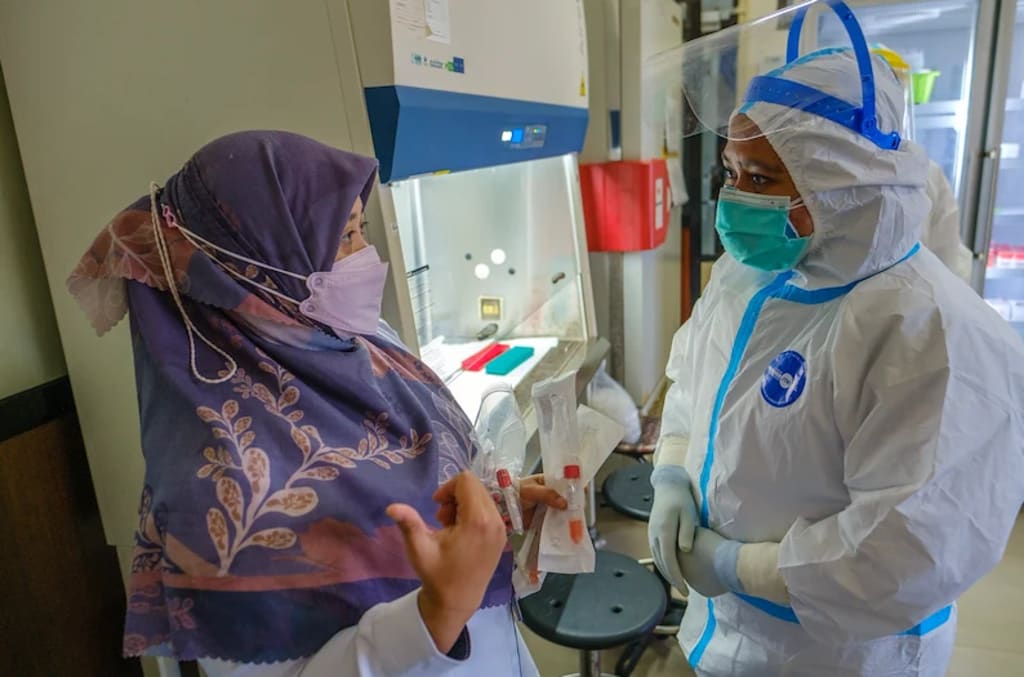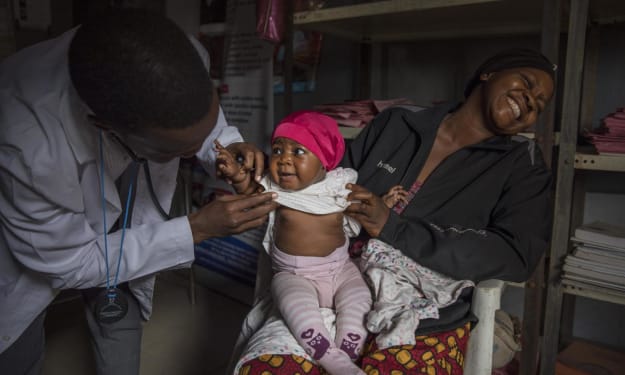These women are battling disease and preparing for future health threats
Genomic lab technology transforms Indonesia's response to health threats

Strong health systems are critical to ending AIDS, tuberculosis and malaria, responding to emergencies that fuel disease, and protecting against future threats to health.
The Global Fund invests $100 million a year in building strong and resilient health systems. In every region of the world, this work is mostly led by women.
In honor of International Women's Day, we spotlight women in Global Fund partnerships who are leading the fight against disease to protect their communities.
Krystal Birungi, Field Entomologist, Uganda
"Every child, wherever they live, should be protected from malaria. Every mother should be free from the fear that her child will die of malaria.
Krystal admits that there aren't many women in her profession.
As a field entomologist, she collects mosquito samples that she and her colleagues study to develop genetic techniques that could block the spread of malaria.
Or as Krystal puts it: "Every day I wake up, I want to kill malaria.
Krystal's battle with malaria was not only professional, but highly personal. She remembers the horror of malaria as a child, her younger brother having convulsions from the disease, and her mother struggling to pay for her child's treatment.
Today, as a scientist and mother, Krystal doesn't face the same hardships her family experienced growing up. She remains committed to ensuring that others are also protected from the disease.
Yulia Marek, Social Worker, Ukraine
"After high school, I moved from my hometown to Kharkov and I fell in love with the city immediately. I didn't want to leave, it's my home now.
Every day Yulia goes to work, she risks her life.
Yulia is a social worker who provides community-based health outreach to prevent, diagnose and treat people with tuberculosis.
She lives and works in Kharkiv, Ukraine's second-largest city, which has been under heavy, often daily, shelling since Russia invaded Ukraine more than a year ago.
“When I went out, I immediately started checking the surrounding sites in case it was shelled. We were not prepared. Nobody was prepared for this,” Yulia said.
Yulia visited various locations in Kharkiv and offered free TB screenings. When a person is diagnosed with the disease, she links them with health and social services.
Despite the danger, she plans to stay in the city and continue her outreach work.
Suzy Haylock, Community Health Volunteer, Honduras
"I take a blood sample, do a rapid diagnostic test and make a diagnosis. Then I give them the pills right away.
Since becoming a community health volunteer two decades ago, Suzy has tested and treated thousands of people for malaria.
"They come to my house and I take care of them at night, in the morning, anytime," she said.
Suzy lives in Cauquira, Honduras, a small town surrounded by lagoons and the Caribbean Sea. It is located in one of the few parts of the country where malaria still poses a serious threat.
In her role, Suzy welcomes patients into her home and conducts community outreach, providing health services and information to those most vulnerable to the disease: children under 5, pregnant women and fishermen.
Volunteer health workers have been the backbone of Honduras' impressive victories against malaria over the past 20 years and turned around setbacks from COVID-19 and deadly tropical storms.
Neema Waziri, Peer Educator, Tanzania
“They learn how to protect themselves from pregnancy and HIV. They can negotiate condom use with men. They can stand up for themselves.
Neema has dedicated her life to educating and empowering young men and women in the community to protect themselves and stand up for their rights.
As a peer educator, she leads a community group for adolescent girls and young women.
“We want girls to be able to raise their voices. If they meet a man, they can stand up for themselves. They can negotiate condom use,” she said.
Neema also provided the girls with condoms and referred them to local clinics for HIV testing.
Her work is critical as 4,900 girls and young women in sub-Saharan Africa are infected with HIV every week.
Nima also knew that to beat the HIV epidemic among young women and girls, she also needed to reach men. So she regularly visits young people who work as motorcycle taxi drivers to speak to them about HIV prevention and provide them with free condoms.
"Today, I love my job," Neema said.
Chinasa Abani, Logistician, Nigeria
"In river areas we use canoes. In sandy areas we use vehicles with big tires. We also use horses, wagons and donkeys.
For more than a decade, Chinasa has helped ensure that people living in some of the world's most challenging regions with the highest malaria rates sleep under the protection of mosquito nets.
Most recently, she was one of the logistics staff for the world's largest mosquito net distribution in Kano State, Nigeria. The campaign delivered 180,000 mosquito nets to more than 880,000 people in just two weeks.
Chinasa and her team oversaw the procurement of the various vehicles used to transport the nets. Kano's campaign has been particularly challenging, she said.
“Kano requires more thought. It requires more care and precision. It requires more labor,” she said.
Chinasa and colleagues organized any mode of transportation needed for the most effective nets, including large trucks, all-terrain vehicles, motorcycles, canoes, boats, horses, donkeys and human movers.
Ida Neni Haryanti, Head of Virology Laboratory, Indonesia
"We will be ready to face the next pandemic...with the availability of whole genome sequencing, we will be able to cover a wider range of diseases.
Ada has had countless challenges and triumphs throughout her career, but nothing quite like the COVID-19 pandemic.
"I remember I was wearing an astronaut suit. It was pretty scary because it was a new pandemic, but ... it was extraordinary, and I was someone the lab trusted to collect the specimens. As scared as I was, I felt Proud," she said.
Ada's work has also been transformed by dramatic advances in diagnostic technology.
In <> September 2022, Ada and her colleagues begin using whole genome sequencing, a laboratory method that can help fight disease and prepare for future health threats. Their work is part of a government biomedical and genomic sciences program that is helping transform Indonesia's laboratory system.
Ada said she hopes the technology will be available throughout the COVID-19 pandemic, but feels she and her team will be better prepared now for future health threats.





Comments
There are no comments for this story
Be the first to respond and start the conversation.